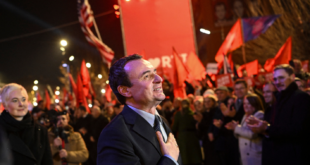BELGRADE
Ahead of EU foreign policy chief Javier Solana’s meetings with Serbia’s senior officials, guests on a B92 TV program debated the issues of Kosovo and visas.
“He is surely coming to announce to us what will happen on Wednesday, July 15, and as Mr. [EC Vice President Jacques] Barrot said when we met in Brussels three weeks ago, the decision the “visa Bastille” for Serbian citizens will fall one day after the French Bastille Day, therefore, on July 15,” Deputy Prime Minister Božidar Đelić said.
“The whole European Commission will support the legal draft for the abolishment of visas for citizens of Serbia, Macedonia and Montenegro on January 1, 2010,” Đelić told B92 TV last night.
It is expected that the EU recommendation will be for all Serbian citizens, including those that live in Kosovo, who will be able to obtainSerbian passports, but who will still need the so-called Schengen visas to travel to the EU.
Đelić said that this kind of separation does not mean an “indirect recognition of Kosovo”.
“We are two sides—the Schengen zone and Serbia. The decision on giving out the white Schengen is not ours, but a decision by those countries,” Đelić said.
“Let me remind you, Slovakia, Greece and Spain are all members of the Schengen zone. This decision cannot be made without these member-states, so such a decision cannot infringe on our territorial integrity in any way, since these countries have not and will not recognize Kosovo,” Đelić said, adding that any indirect recognition would violate the principle stance on Kosovo and the sovereignty of Serbia “that these three countries have”.
“There is no fear, in that regard, that Europe is trying to take Kosovo from us,” stated Đelić.
He added that in the fall, Belgrade is expected to receive another delegation of the European Commission which will evaluate the rate of reforms in Serbia.
Democratic Party of Serbia (DSS) official Nenad Popović, who was also a guest on the same program, said that the opposition parties believe this partial liberalization should not be accepted and that negotiations with the EU should continue.
“With 15 or 30 more days of negotiations, they can be convinced that all citizens must be on the white Schengen list. No one in Serbia should be discriminated against,” Popović said.
Former foreign minister and current OSCE coordinator Goran Svilanović said that accepting visa liberalization in this form “would not mean that Serbia is recognizing Kosovo’s independence”.
He however added that what’s more important in this regard are future plans of the EU in contacts with Priština.
“That means that those who live in Kosovo will be able to receive Serbian passports in a procedure. What kind of procedure, I cannot specify,” he said.
 Eurasia Press & News
Eurasia Press & News



